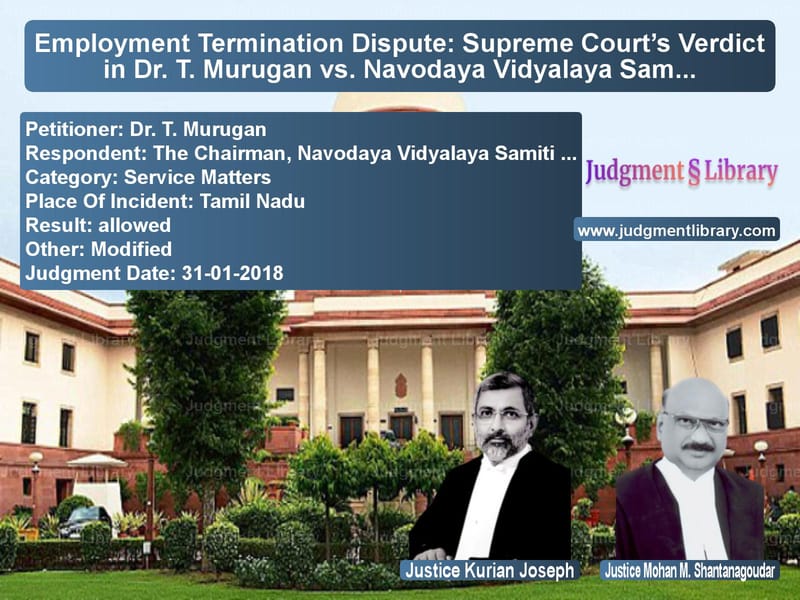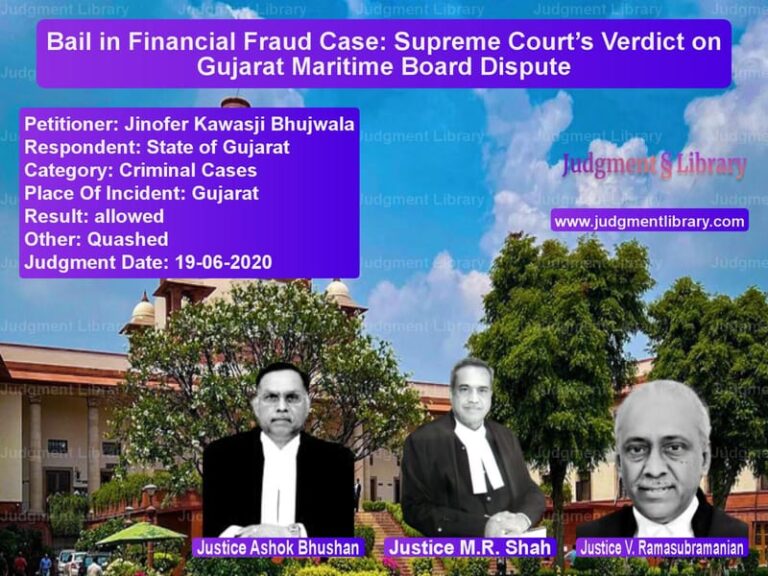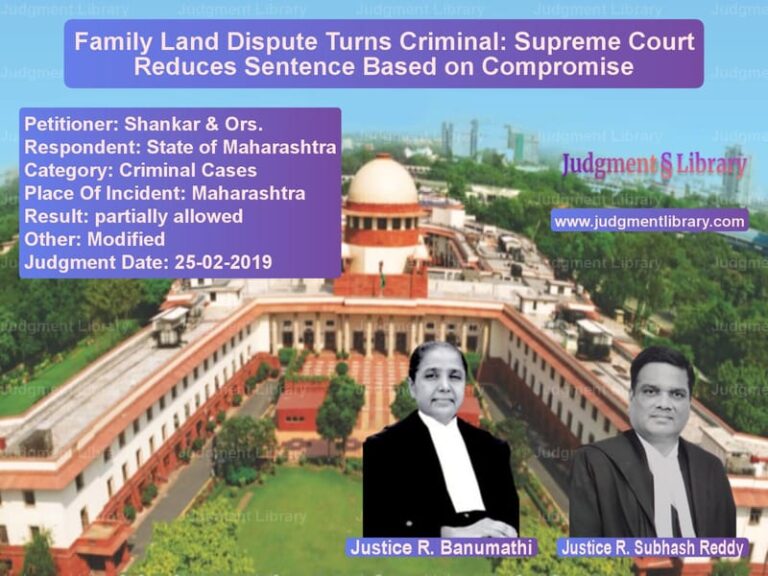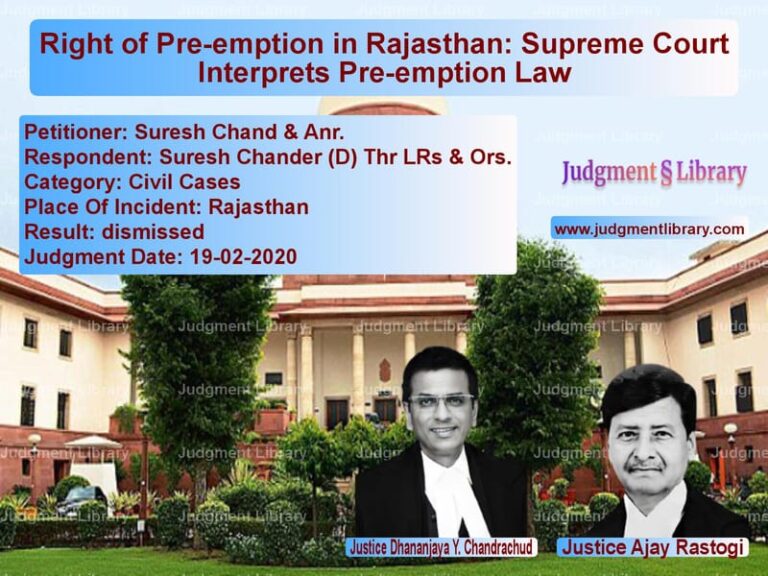Employment Termination Dispute: Supreme Court’s Verdict in Dr. T. Murugan vs. Navodaya Vidyalaya Samiti
The case of Dr. T. Murugan vs. The Chairman, Navodaya Vidyalaya Samiti is an important judgment in the field of service law, focusing on employment termination, procedural fairness, and judicial intervention. The Supreme Court was called upon to decide whether the termination of the appellant, a school principal accused of misconduct, was valid and whether procedural lapses warranted judicial relief.
Background of the Case
Dr. T. Murugan was employed as a teacher at Navodaya Vidyalaya from June 5, 1989. Over time, he was promoted to the position of Vice-Principal in 1998 and later Principal in 2001. However, his tenure was cut short due to allegations of sexual harassment involving a Class X student.
The following events transpired:
- On December 18, 2002, he was suspended from duty pending an inquiry.
- A three-member committee was constituted to investigate the allegations.
- Based on the committee’s report, he was dismissed from service on June 13, 2003.
- He challenged his termination before the Central Administrative Tribunal (CAT), which ruled in his favor and ordered his reinstatement with back wages.
- The employer (Navodaya Vidyalaya Samiti) challenged the CAT’s ruling in the Madras High Court, which overturned the CAT’s order and upheld his termination.
- Dr. Murugan then appealed to the Supreme Court, which had to decide whether the termination was justified and procedurally sound.
Arguments Before the Supreme Court
Arguments by the Petitioner (Dr. T. Murugan)
- His visit to the student’s premises was in the presence of a school chowkidar (guard) and was meant to persuade the student to attend examinations.
- The Deputy Director’s report held him guilty, but a subsequent Magisterial Inquiry completely exonerated him.
- He was denied a fair trial because he was never served with a copy of the three-member committee’s report and thus could not challenge it.
- The Central Administrative Tribunal (CAT) had correctly ruled in his favor, and the High Court had wrongly overturned it.
- His termination lacked adherence to due process under the Central Civil Services (Classification, Control and Appeal) Rules, 1965 (CCS Rules).
Arguments by the Respondent (Navodaya Vidyalaya Samiti)
- The internal inquiry by the three-member committee found Dr. Murugan guilty.
- The Deputy Director of Education upheld the committee’s findings.
- The decision to terminate him was based on substantial evidence of misconduct.
- The CAT erred in interfering with the employer’s disciplinary decision.
- The High Court correctly ruled in favor of the employer by upholding the termination.
Supreme Court’s Observations
On Procedural Fairness
- “The appellant has a serious grievance that he was not served a copy of the report of the three-member committee and, therefore, he did not get an opportunity to challenge the same.”
- “Whether we should rely on the Magisterial Inquiry or the Inquiry held by the three-member committee is one issue, but the fact remains that the regular inquiry under the CCS Rules was dispensed with.”
On the Role of the Deputy Director
- “The High Court, it appears, has taken note of the report prepared by the Deputy Director and has placed heavy reliance on that.”
- “Unfortunately, the allegation raised by the appellant that the wife of the Deputy Director was a teacher in a different school under the Navodaya Vidyalaya Samiti and that the Deputy Director had some motive against the appellant, which he stated in the inquiry before the Committee, has not been noticed.”
On Retirement and Pension
- “We are informed that the appellant is due to retire on 12.02.2018. We are also informed that there is no regular pension scheme under the Navodaya Vidyalaya Samiti.”
Supreme Court’s Final Judgment
The Supreme Court, instead of ordering a retrial, exercised its power under Article 142 of the Constitution to grant relief while ensuring procedural justice. The Court ruled:
- The termination order of June 13, 2003 was set aside.
- Dr. Murugan would be deemed to have voluntarily retired on June 13, 2003.
- He would be entitled to all benefits accrued until June 13, 2003, including salary and service benefits.
- The amount due to him would be paid with simple interest at 6% per annum.
Legal Significance of the Judgment
This ruling has several key implications:
- Procedural Fairness: Employees must be provided with inquiry reports to allow them to contest allegations.
- Balance of Justice: The Court provided relief without reinstating the employee, thereby avoiding disruption to the employer.
- Article 142 Powers: The judgment illustrates how the Supreme Court can use equitable jurisdiction to ensure justice.
- Retirement Benefits: The ruling ensures that employees terminated in unfair circumstances receive financial relief.
Conclusion
The Supreme Court’s ruling in Dr. T. Murugan vs. The Chairman, Navodaya Vidyalaya Samiti sets a precedent in cases where procedural irregularities are found in disciplinary actions. It underscores the need for a fair inquiry process while balancing the interests of employees and employers. By invoking Article 142, the Court provided an equitable resolution, ensuring justice for the appellant while respecting the employer’s concerns.
Don’t miss out on the full details! Download the complete judgment in PDF format below and gain valuable insights instantly!
Download Judgment: Dr. T. Murugan vs The Chairman, Navoda Supreme Court of India Judgment Dated 31-01-2018.pdf
Direct Downlaod Judgment: Direct downlaod this Judgment
See all petitions in Termination Cases
See all petitions in Disciplinary Proceedings
See all petitions in Judgment by Kurian Joseph
See all petitions in Judgment by Mohan M. Shantanagoudar
See all petitions in allowed
See all petitions in Modified
See all petitions in supreme court of India judgments January 2018
See all petitions in 2018 judgments
See all posts in Service Matters Category
See all allowed petitions in Service Matters Category
See all Dismissed petitions in Service Matters Category
See all partially allowed petitions in Service Matters Category







